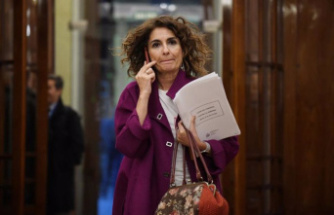Ensures that the GDP data for the third quarter, which will be released this Friday, will reflect economic growth
MADRID, 26 Oct. (EUROPA PRESS) -
The First Vice President of the Government and Minister of Economic Affairs and for Digital Transformation, Nadia Calviño, insisted this Wednesday that the economic indicators "do not point" to a "technical recession" for the Spanish economy.
The president of the Independent Authority for Fiscal Responsibility (AIReF), Cristina Herrero, yesterday did not rule out the entry of Spain into a 'technical recession' (two consecutive quarters of falling GDP), since the economy would enter "negative terrain" in the last quarter of 2022 and would continue like this also during the first of 2023.
When asked about this, Calviño, in statements to Telecinco reported by Europa Press, assured that "the economic indicators do not point to a technical recession" and explained that these differences in the forecasts are due to the "great uncertainty" that exists in the current situation.
"There were analysts who said that we were going to enter a recession in the second quarter of the year and we have had a record quarter, with growth of more than 1.5% and year-on-year growth of more than 6%. Forecasts must be taken very carefully. caution and we must be prepared for the worst, being very cautious, and that is what we are doing from the Government", he pointed out.
Calviño has also highlighted that all national and international organizations, public and private, foresee growth for Spain in 2023. Moreover, he has highlighted that Spain will be the country that grows the most next year within the large European economies.
That does not mean, he specified, that the current moment is "very delicate" and he added that if Germany stops, it will affect the rest of the EU countries, although Spain, he has said, is one of "the least exposed" to the impact of the war because it does not have the energy dependency that the Germans and other countries of Russia have.
Asked about the GDP data for the third quarter, which the National Institute of Statistics (INE) will publish this Friday, Calviño has assured that "all the indicators" that he has at his disposal point to economic growth in this period.
"The tourism sector has had a spectacular 'boom', but the industrial sector is also doing well and exports have been very strong. All the indicators point to a third quarter of economic growth", emphasized Calviño, who added that the creating employment and that month after month "the position of Spain is strengthened in this very difficult context".
The vice president has also underlined that inflation has begun to fall and that it will continue on that path "in the coming months", as well as energy prices, which are also falling. "That is good news in the uncertainty of what will happen with the war in the winter," she has indicated.
In this context, in which interest rates have also risen, Calviño has assured that the Government is trying to "relieve as much as possible" the situation of families and companies, although he is aware that the measures adopted "do not cancel 100% the negative impact" of the war and inflation.
"We are trying to reach the economy and society as a whole by rationally using public money and we have made prudent Budgets to have room for next year", he defended.
Likewise, the vice president hopes to be able to reach an agreement with financial institutions "in the coming weeks" to further alleviate the situation of families with mortgages affected by the rise in interest rates.
"It is clear that inflation impoverishes us all and affects the most vulnerable the most. I hope that the financial entities that are now announcing record profits will pitch in," Calviño said.
Among the measures proposed by the bank, he recalled, are lengthening mortgage periods, flattening the rise in interest rates and seeing how households with higher incomes that have a mortgage can be helped. "All these measures would go in the right direction to alleviate the situation," said Calviño.













